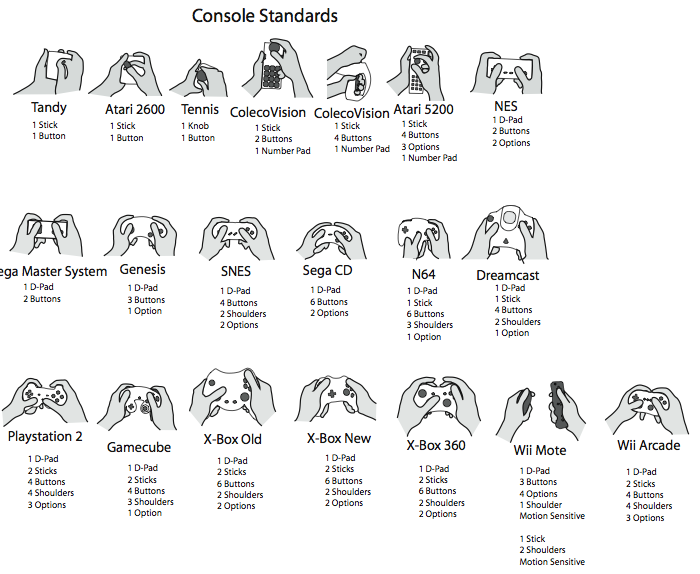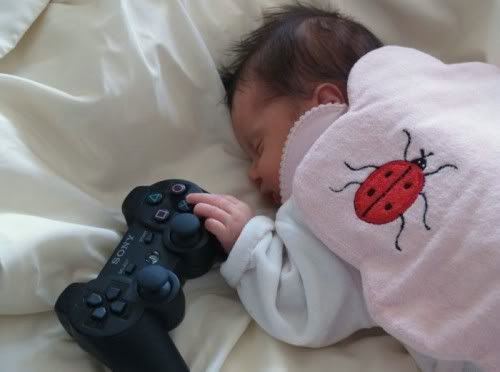Barriers to Entry
By matski53 17 Comments
Barrier to Entry
@matski53 For more articles like this head on over to my blog - http://gamewhelk.com/
Shining a light on how motion controls break down barriers, whilst inadvertently creating others. And why gamers shouldn’t sneer at alternative control options.
I recently handed my 360 controller to my Grandad, I never got it back.
He had questioned me “What are these things you play, do you get high scores?” Clearly he had some vague memory of space invaders or an old arcade points based game, but no knowledge of any subsequent advancements in Videogame technology.
My Grandad enjoys Western movies I thought; maybe Red Dead Redemptionwould be a good starting point to introduce him into the world of modern Videogames. It is centred around classic Western themes of technology encroaching upon the old ways of life, morality, redemption and the struggle for survival in the barren lawless dust ball that was the southern American frontier circa 1911. Maybe he would come to think of John Marsten as some kind of Eastwood type protagonist I pondered. “Look Grandad, instead of passively observing a western you can now take part in an interactive one!” I handed him the controller.
Nothing happened for a while. I looked at him, watched his eyes, he wasn’t looking at the screen, he was staring at the controller. He twirled it in his hand, sizing it up. “Come on granddad, just press the green button to run” He thumbed the big shiny green button in the centre of the controller. “No Grandad not that green button, that’s the home menu button, press then one with an A on it”
A strange expression crumpled his face, a triumvirate of bemusement, bewilderment and bafflement. He was attempting to comprehend this alien piece of technology before him. Fear and apprehension contorted his face, his eyes clouded with worry and confusion. Cautiously, tentatively, he slowly squeezed the right trigger.
Marsten raised his pistol and fired off a round shooting a passing civilian.
Startled he sprung from his chair, cast my controller into the fireplace, held aloft a crucifix and began dowsing the room with holy water. “What is this black magic!? This evil tool of bodily contortion. BE GONE VILE DEMON, SICK PUPETEER OF PEOPLE, LEAVE THIS HOUSE AND NEVER AGAIN RETURN!!”
Imagine if I had given him Demon Souls.

No entry for you Grandad, silly NOOB!
OKAY, so that might have been a slightly exaggerated embellishment of a true story, I actually got my controller back unscathed. But the point remains that my Grandad had shown a passing interest in Videogames, he was actually impressed by the look of Red Dead Redemption and appeared to be genuinely intrigued by my description of its narrative themes. Yet his unfamiliarity with the controller posed a barrier between him and a gaming experience that he most probably would have enjoyed, one that could have changed his perception of the medium.
I am sure many gamers have encountered the same paradigm; unsuccessfully attempting to guide a non-gamer by yelling out button instructions: “Square to kick, no not circle! Does that look like a square, are you stupid! PRESS SQUARE YOU IDIOT, SQUARE!! Ohhh nooo you dead.” Videogames can look like a pretty silly hobby to the outsider when Commander Sheppard spends 5 minutes running into a wall.
The fact is that people without the necessary skills and dexterity to successfully navigate the treacherous minefield of buttons, sticks and triggers constituting a modern day controller, simply cannot experience the rich and complex worlds that gamers champion as the great milestones of ‘core’ gaming experiences.

An illustration from an article on Gizmodo illustrating the evolving complexity of Videogame controllers. Look how big the Xbox controller is! That thing was a beast. (link)
Unlike my Grandad however I was born in 1989, and like most gamers grew up as part of a Videogame generation. Throughout childhood I developed a familiarity and adeptness with numerous controllers. From the NES to the Genesis, and the N64 to the Xbox, the first joystick to shoulder buttons, triggers and vibration, handling Videogame characters through a controller has become second nature to me, much like a second language. And it is increasingly common that children are exposed to Videogames at younger ages, developing these skills earlier and earlier.

But what of the older generations, or those that missed out on the medium during their youth? Those that do not understand it, but might wish too?
They remain rejected by the classic controller as we know it, uninvited to the party and deemed unworthy on account of their impudent lack of skill. I would not be so naive as to suggest that everyone in the world hides secret desires of becoming a gamer, but those that do face the impervious obstacle of the controller.
Consider other creative mediums. Music, Movies, Literature, Sculpture, Paintings etc. All of which can be universally appreciated by anyone so long as you have a working set of human senses. Yet not Videogames.
The arrival of Nintendo’s DS in 2004 and Wii in 2006 appeared to address this problem. Whether through the wise omniscient sage like perceptions of MR’s Miyamoto and Iwata, or simply by sheer luck Nintendo had stumbled across a potential solution to the off-putting complexity of the controller to the videogame outsider. Suddenly there appeared to be a control method that required no prior knowledge of button layouts, it would be intuitive for everybody, only demanding that you had working use of your limbs. We would all soon be spanking Epona around the planes of Hyrule, twirling the edges of Wario’s moustache and lobbing Pikmin about with the simple ease of a few intuitive arm movements. The future was indeed bright and full of unicorns and candyfloss, and we would all play happily ever after, gamers and non gamers hand in hand.
But fast forward to the present and very few successful core gaming experiences centred around full motion control implementation exist. Granted there are some examples; namely Mario Galaxy, Metroid Prime 3 and Red Steel 2 (and judging by the early Skyward Sword reviews link is will soon join this list), yet they all utilise motion controls as a supplement to ordinary button inputs. Instead the shelves of GameStop and GameStation are littered with cheap waggle-ware, with poorly implemented motion controls. Microsoft and Sony’s recent forays into this arena with Kinect and Playstation Move have produced no better results so far either.
To their credit they are however the pioneers, the initial stepping stones toward breaking down that button filled barrier between the non-gamer and the medium of videogames. And whilst I might find Wii bowling about as substantial a gaming experience as a leaf of lettuce for lunch, my parents, girlfriend and everyone I know that isn’t a gamer finds motion controls to be a great deal more intuitive than a multi-buttoned controller. Much more so than me shouting button commands.
Looking back now it may have been slightly foolish to think that all core games could effectively incorporate motion controls. Videogame design has evolved hand in hand alongside the classic controller, and it takes a lot of a lot of time, money and resources for developers to start from scratch, designing new gameplay around such unexplored and unique control methods. Instead a situation has arisen in which it is easier to tack motion controls onto existing designs, instead of developing from the ground.
Consequently they may be lacking in great motion controlled core gaming experiences, but as consoles the DS and WII have succeeded in challenging perceptions of the industry from the casual observer, and for that they deserve praise.

You may look like a bit of a floppy sausage flailing your limbs around the living room, but motion controllers allow those that would otherwise has bolted at the sight of an ordinary controller to enter the world of gaming.
So don’t quickly dismiss Bioware’s inclusion of voice activated commands inMass Effect 3, the ability to play Bioshock Infinite with Playstation Move or any other implementation of alternative control options. These are experiments that have the potential to make such experiences more accessible to the non gamer.
Or maybe progress will halt and we will all be left waggling our phallic wands around the living room in search of Elbits. Who knows?
If motion controls can eventually accomplish anything though, it will be the breaking down of these barriers through the development and implementation of new control methods, that are far more intuitive to the non-gamer. Breaking down that generational gap that lead to the misunderstanding between my Grandad and me.
There is however a different problem with removing the classic controller from the equation. In doing this the element of skill that comes with a lifetime of accumulated controller expertise is lost. If everyone could control Call of Dutywith their minds then the playing field is levelled, and the sport-like competitive aspect of skill associated with controller dexterity would be lost. It is little surprise then that many core gamers have a rather dismissive attitude toward casual motion controlled gaming. It at once breaks down barriers for non-gamers, whilst also creating barriers of hostile non-acceptance from gamers who feel the skill of their favourite pastime is being lost.

It takes an undeniable level of ability to execute Zangiefs' Spinning Pile Driver flawlessly (watch this guy - link).
This hostility from the core gaming community over casual motion controlled games was evident after Microsoft’s press conference at this years E3. Where Many journalists were off put by the focus on Kinect controlled games.
It is all well and good for us children of the Videogame generations though, we piffle at the task of organising a Zerg rush through an assortment of mouse clicks and keyboard shortcuts with all the flexibility and skill of Catherine Zeta Jones navigating a laser maze. But the level of skill required for what many would call a proper hardcore gaming experience is a barrier to anyone that may have ever developed a passing interest in the medium. So don’t knock the Wii, Playstation Move or Kinect. Embrace them for what they are; attempts to widen the market, increase the exposure and acceptance of games as a form of entertainment, and maybe serve as a portal through which your Grandad can enjoy the adventures of John Marston sometime in the future. But by the same metric do not dismiss the skills and reflexes that have proved so integral to the evolution of gaming so far. These are genuine skills and as such should not be lost to inadequate waggling.
And buy your Grandad a DS and Dr Kawashima's Brain Training for Christmas. He won’t throw that on his fire or attempt to exorcise it.
Hopefully.
For more articles like this head on over to my blog - http://gamewhelk.com/


17 Comments